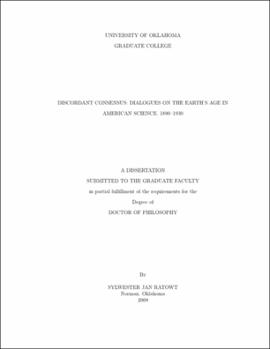| dc.contributor.advisor | Barker, Peter | |
| dc.creator | Ratowt, Sylwester Jan | |
| dc.date.accessioned | 2019-04-27T21:28:09Z | |
| dc.date.available | 2019-04-27T21:28:09Z | |
| dc.date.issued | 2009 | |
| dc.identifier | 99216412902042 | |
| dc.identifier.uri | https://hdl.handle.net/11244/318755 | |
| dc.description.abstract | The history of investigation of the Earth's age during the second half of the 19th and first half of the 20th centuries has been often presented as a narrative of a disciplinary conflict. In this dissertation, I investigate the evidence which supports such accounts as well as evidence contrary to it. I conclude that this disciplinary conflict narrative underestimates the complexity of the historical situation and points to broader inadequacies in understanding of group knowledge and consensus. The larger question I ask is ``what does it mean for a group of people to know something?'' I argue that we need view the historical actor as composed of (dialogically interacting) multiple subjects: the individual who strives for understanding and multiple community members who strive to communicate. Furthermore, I introduce the concept of an imagined community member, the image that an interlocutor has of an anonymous member of a given community, who represents its knowledge, assumptions, and expectations. | |
| dc.description.abstract | Based on an investigation of previously unexamined archival and printed sources, I argue for a new periodization of dialogues on the Earth's age in America. Prior to the 1890s, only isolated American scientists spoke about the topic. After a period of intensified discussion during the years 1892--3, the scientific community started to give a uniform answer to the question about the Earth's age,which was the disciplinary conflict story. This uniform community response, however, corresponded only to a consensus of response, not a consensus of shared belief. The next period covering the first two decades of the next century, corresponded to the fragmentation of the discussion of the Earth's age into multiple, non-interacting, largely disciplinary dialogues. A new consensus did not emerge again until around 1930, when a new community emerged and claimed jurisdiction over the question of geological time. In addition to challenging the disciplinary conflict narrative I also argue that the significance of the discipline of chemistry, and of two individuals, Joseph Barrell and Alfred C. Lane, to the dialogues on the Earth's age has been undervalued in current historiography. | |
| dc.format.extent | 262 pages | |
| dc.format.medium | application.pdf | |
| dc.language | en_US | |
| dc.relation.requires | Adobe Acrobat Reader | |
| dc.subject | Earth (Planet)--Age | |
| dc.subject | Geological time | |
| dc.subject | Communication in science | |
| dc.title | Discordant Consensus: Dialogues on the Earth's Age in American Science, 1890--1930 | |
| dc.type | text | |
| dc.type | document | |
| dc.thesis.degree | Ph.D. | |
| ou.group | College of Arts and Sciences::Department of History of Science | |
